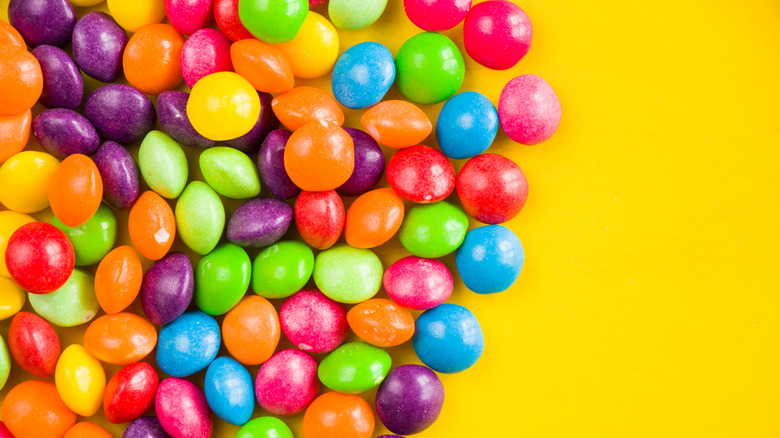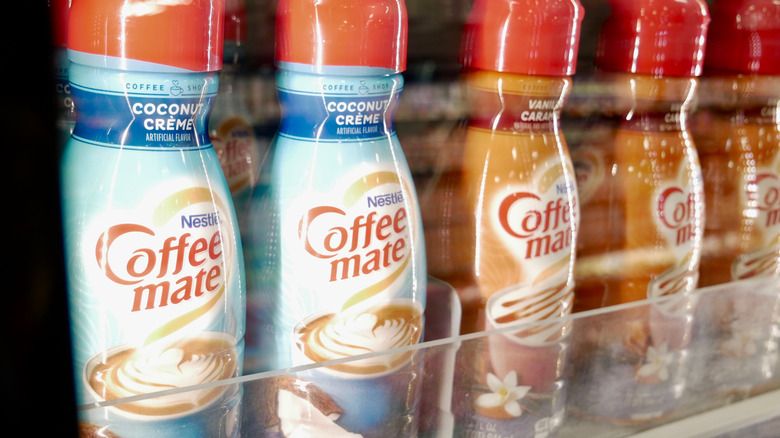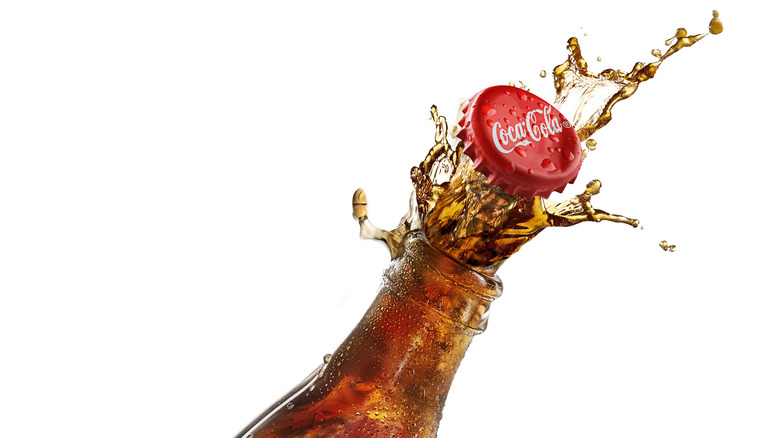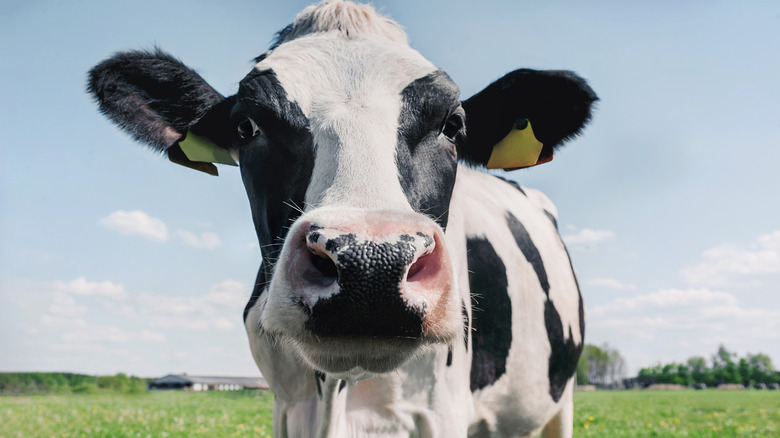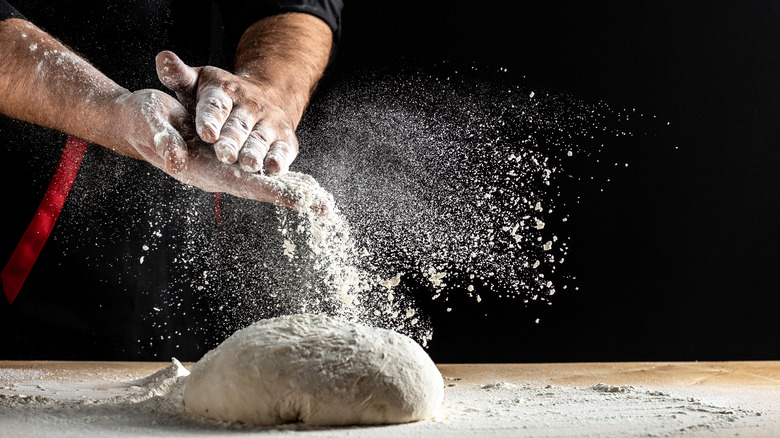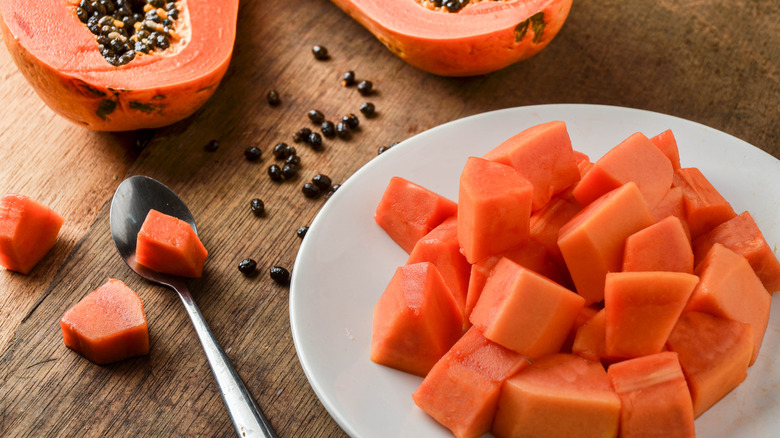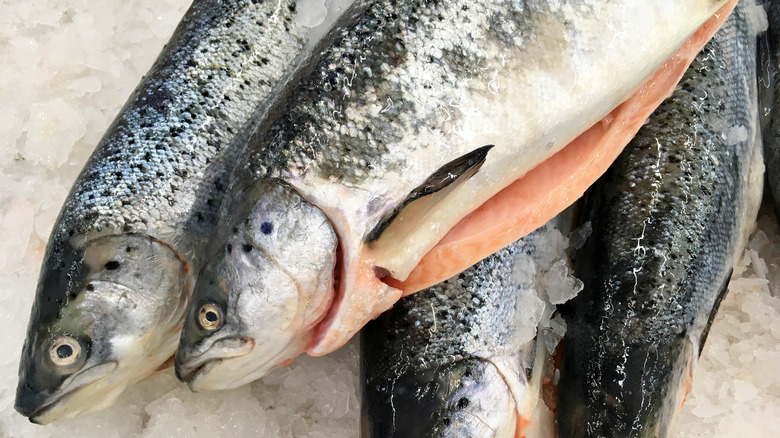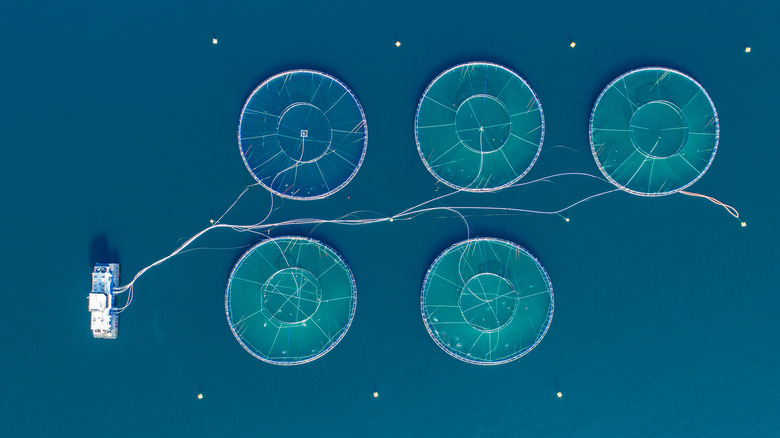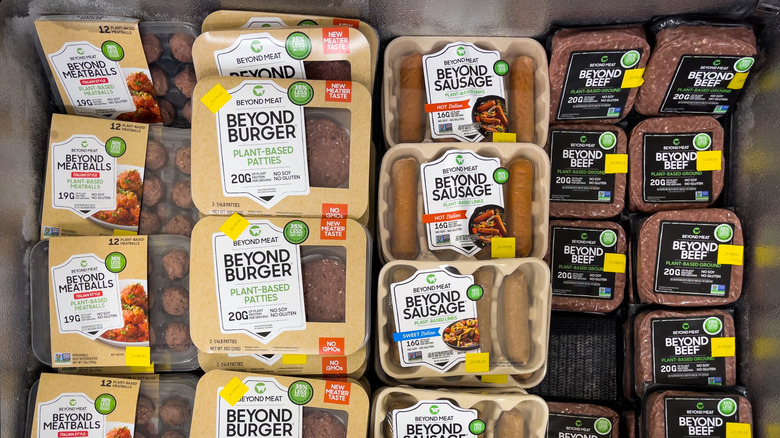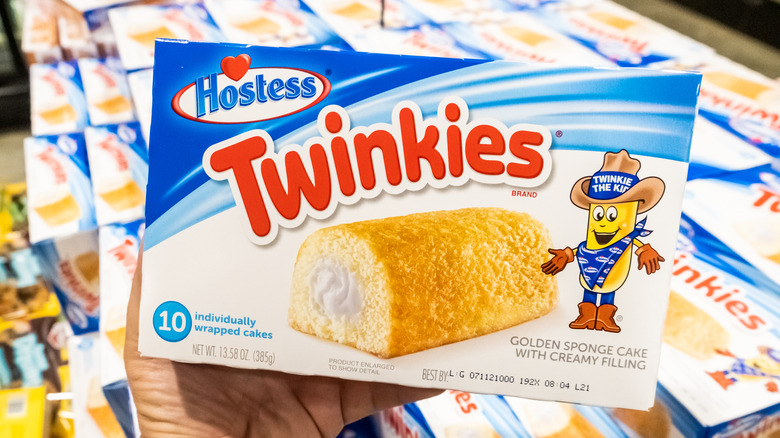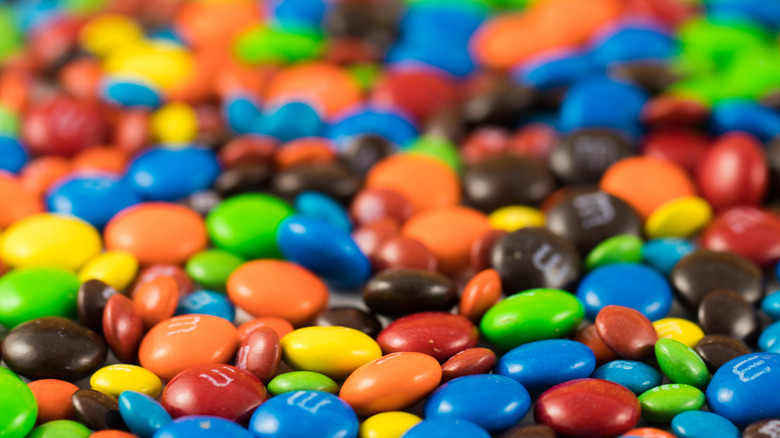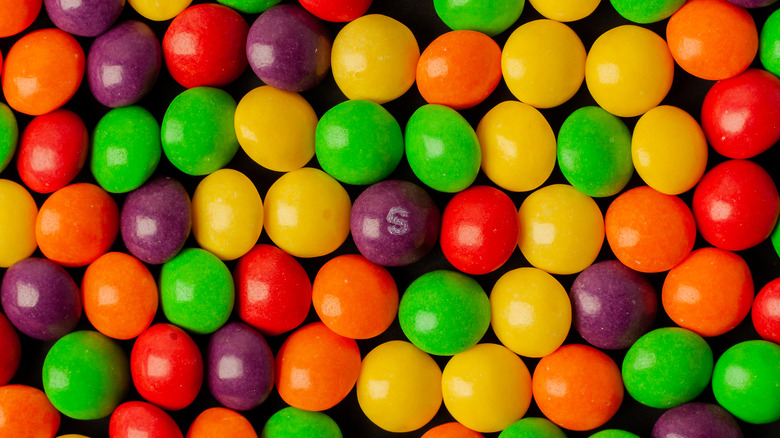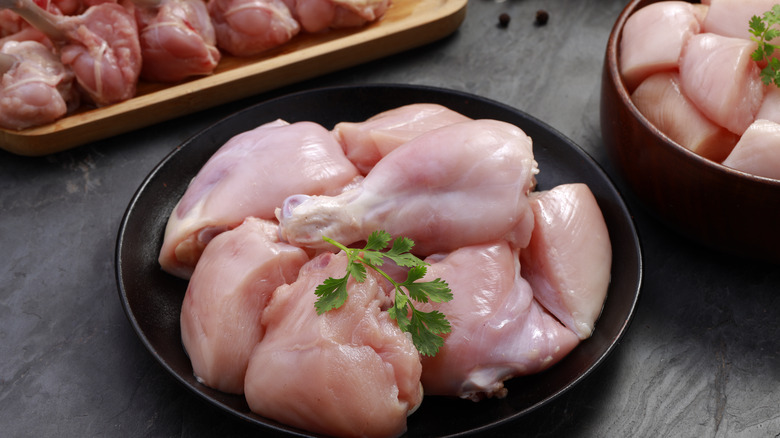American Foods Banned In Other Countries
While a handful of foods beloved in other countries have been banned from American shores (Kinder Eggs and Roquefort, we're looking at you), the fact of the matter is that in the world of culinary legislation, the U.S. is decidedly more lax than other countries. Head abroad, and you may find that some of your faves, from Coca-Cola to Coffee-Mate, are nowhere to be found, have had their recipes slightly changed, or are only available with worrisome on-packaging labeling claiming that these faves are hazardous to your health.
The reasons why some foods are easily found in the U.S. but are heavily regulated abroad vary. However, they're mainly to do with the ways that different food safety authorities react to new research. The European Union, for example, is famous for taking a more conservative approach to food safety standards, removing potentially hazardous additives the moment that evidence begins to point to their harmful nature.
But additives aren't the only element to this story. The world of food regulation also has to take climate change, animal welfare, and economics into account when deciding whether a type of food that's commonplace in America will be available in local stores. Want to know what that means for your favorite snacks, pantry staples, and more the next time you travel abroad or search your own local stores? Read on!
Coffee creamer
Shelf-stable coffee creamer must have seemed like a dream come true when it first appeared on supermarket shelves in the 1950s (via SoyInfo Center). A shelf-stable product that can make your coffee taste like anything from caramel to vanilla to pumpkin and doesn't need to be refrigerated? Magic, right? Not exactly. Coffee creamer is made with a combination of sugar, flavorings, and stabilizers, not to mention hydrogenated vegetable oils. It all means that non-dairy creamers are one of the last remaining vestiges of trans fats on the American market.
After first coming to light in the early 2000s, the health risks of trans fats led to a good deal of legislation regarding their use even in the U.S. They've since disappeared from most big brands. But according to data from the Environmental Working Group, trans fats still show up in everything from breakfast bars to peanut butter to pudding mixes. And worst of all, there's often no way for consumers to know that they're in a given food item: via a sneaky loophole, these brands have evaded American labeling laws.
In Europe, trans fats have either been banned or strictly regulated, so the creamers that are worst for you, at least in terms of these fats, won't appear on shelves. Add to this the fact that many creamers also contain carrageenan, a seaweed-derived thickening agent that has been linked to inflammation and possibly cancer (via The Cornucopia Institute). Perhaps it's better that the EU is taking a pass.
American Coke
Hyped north of the border since 2005, Mexican Coke boasts better flavor than its American counterpart in large part because it relies on a more traditional recipe employing cane sugar instead of the high fructose corn syrup used stateside. And it's for this very distinction that American Coke would be outlawed — or at least heavily regulated — in much of Europe.
Coke first started using high fructose corn syrup as a sweetener in the '80s thanks to cheaper prices linked both to corn subsidies and to a glut of corn, according to Mother Jones. But while high fructose corn syrup might taste like sugar, we know that it doesn't act like sugar in the body. High fructose corn syrup has been linked to issues like insulin resistance, diabetes, cardiovascular illness, and more, per the Cleveland Clinic.
But while this is certainly food for thought, it's surprisingly not the reason that high fructose corn syrup is regulated in the EU. It's actually all down to economics. In the European Union, production quotas of high fructose corn syrup are regulated to ensure safe agricultural development across the nations that are part of the union, according to Livestrong. It's been that way since 2005. But whether for health reasons or economic ones, one thing is certain: European Coke is arguably a little bit sweeter thanks to the absence of HFCS.
rBGH milk
Despite how weird it might seem to Americans to find that the French, for example, mainly consume shelf-stable milk, many might argue that it's actually American milk we need to be wary of — especially conventional milk, much of which is spiked with hormones.
Originally developed by Monsanto to help increase dairy cows' milk production, rBGH (which stands for recombinant bovine growth hormone) quickly became fairly pervasive in the American milk supply following its 1993 approval, according to HuffPost. The use of rBGH makes it easier for companies to produce vast amounts of cheaper milk, often in pretty awful factory farm conditions (via ASPCA).
And the use of this hormone isn't just bad for the animals, as it could well be that drinking all that hormone-rich milk is far from a healthy choice for people, too. Human studies show that drinking milk from cows treated with rBGH can potentially increase the risk of cancer. According to the American Cancer Society, it's not necessarily the rBGH that's causing the problem, but that milk from rBGH-treated cows can produce another hormone, IGF-1, that is linked to cancer. It's no surprise that the hormone is effectively banned in some EU nations, per The Sociological Quarterly.
All Trumps Flour
Potassium bromate is an additive that encourages quick gluten formation, making bread fluffy, soft, and ivory white. Unfortunately, it's also a possible human carcinogen that is illegal in countries around the world from China to Canada to Brazil, according to Live Science.
In the U.S., too, this additive has mainly been phased out of baked goods, despite the apparent fact that most potassium bromate converts to the harmless potassium bromide during baking. Beginning in 1991, California law required an on-label warning that foods might contain potassium bromate. To avoid having to explain why everyday goods like bread and crackers had a danger warning on their packaging, most food companies have since moved away from using the additive.
But there's one exception that's still widely available on the American marketplace. General Mills' Gold Medal All Trumps flour (no relation to the American president of the same name) is a high-gluten, enriched flour often used in baked goods like pizza, bagels, and bread. You can snag massive bags of this flour easily online, and it might also be used in professional kitchens looking to get that gleaming white color. Just don't expect to find it on non-American shelves anytime soon.
Hawaiian papaya
Genetically modified foods have caused quite a stir in the past decade or so, with some claiming that they may be the secret to battling the effects of climate change, while others argue just as vehemently that they will kill biodiversity — and even kill people.
Whereas pushes for increased GMO regulation — or at least more clear labeling of GMO products — in the U.S. have proven slow-going, GMOs are heavily regulated in Europe. Moreover, a recent ruling saw them banned outright in Mexico, according to Greenpeace. This means that not only is the vast majority of American corn and soy forbidden on the Mexican market (over 90 percent of both crops grown in the U.S. are genetically modified) but so too are most Hawaiian papayas.
However, before you totally condemn GMO papayas, this is also arguably a case of helpful genetic modification. Following the decimation of the Hawaiian papaya industry by the papaya ringspot virus, which almost wiped the fruit out entirely by the 1990s, Food Insight reports that a local scientist engineered the rainbow papaya. The new variety was genetically designed to be resistant to the virus. Today, it makes up about 90 percent of Hawaii's papaya crop.
Given EU regulations, however, this papaya is still strictly forbidden. The first non-approved papaya appeared on the European market back in 2004, and in 2012, a "wave" of banned papaya sightings led to a warning and a call for vigilance regarding GM papayas, notably those from Thailand.
GMO salmon
These days, GMO crops are relatively commonplace. Not only are over 90 percent of American soy and corn productions genetically modified, but so too are some sugar beets, potatoes, apples, and more. But GMO animals? Now, that's a horse of a different color! While some work has been done in the development of GMO pork, for example, the very first — and currently only — genetically modified animals for human consumption to appear on the market thus far have been salmon. Developed by AquaBounty, this salmon splices genes from several related fish species for a fish that can be brought to market more quickly. It first appeared on Canadian shelves in 2017, per Nature, and has since been approved for sale in the U.S., according to AP News.
But across the Atlantic, folks are less than thrilled by this development. According to Salmon Business, one review commissioned by the European Commission dubbed the presence of the salmon on the European market "unrealistic," given the EU's historic and continued wariness around GMO regulations.
However, there is a possible loophole that may still bring the modified salmon into European stores. Some have sought to draw a distinction between traditional methods of GMO technology and the new transgenic technology used to develop the AquaBounty salmon. If the EU decides to be laxer on these more modern techniques, as Reuters notes that the union might, then it's possible that GMO salmon still make it onto European plates in the future.
Farmed salmon
As it currently stands, GMO salmon definitely won't be allowed to be sold in parts of Argentina, but not for the reasons you may think. Indeed, Argentina hasn't banned GMO salmon outright. Instead, earlier this year, the country's Tierra del Fuego region banned something far more widespread: salmon farmed in marine cages (via Green Queen). The bill, which passed unanimously in the provincial legislature, is the first such kind of regulation to address the widespread problem of salmon aquaculture. Over the years, this practice has faced phenomenal and increasing opposition from environmental, humane, and health-conscious groups.
Salmon farming has long been denigrated by sustainability advocates due to its negative effects on marine ecosystems. According to the Environmental Working Group, farmed salmon are raised in cages in the oceans and are intentionally fattened up more than their wild cousins, increasing the accumulation of pollutants in their bodies. And, per the Natural History Museum, farmed fish are more susceptible to parasites like sea lice, which can require harsh treatments that delay harvests. The carnivorous fish also require a rather unsustainable diet derived from smaller fish, effectively consuming more protein than they provide when harvested.
As for the health risks, in addition to being less nutrient-dense than wild salmon, per Healthline, farmed salmon has been found in some cases to contain dangerous levels of chemicals like methylmercury and dioxins (via European Food Safety Authority).
Beyond Meatballs
Head to France, and you won't be finding Beyond Meatballs anywhere. At least, you won't find them with that exact name. Now, France is historically a meat-loving society, so it's heartening for climate-conscious folks to see that steps are being taken to reduce reliance on animal protein in the nation, as The Guardian reports. Notably, the charcuterie and offal capital of the country — that would be Lyon, by the way — even went so far as to remove meat from kids' school lunches, though to a considerable uproar.
But while France is certainly taking strides towards being more vegetarian and vegan-friendly, agricultural lobbies do want to protect one part of the meat and dairy industry they consider fairly essential: its language. France heavily legislates how products like veggie burgers and vegetarian sausage can be marketed. Namely, vegetarian products that seek to emulate the flavor, texture, or appearance of animal-derived products — things like burgers, sausages, cheese, and, indeed, meatballs – cannot use those words. Enter a panoply of creative workarounds like soy "drink," veggie "slice," or even the delightful portmanteau known as faux-mage — a combo of the word faux (false) and fromage (cheese).
Twinkies
It's perhaps no surprise that the ultra-processed snack food known as the Twinkie is banned in some parts of the world, but it's not because these sponge cakes may well outlast the apocalypse. In fact, the opposition to Twinkies comes down to their color.
Food coloring is used to increase the appeal of many foods, from cakes to candies to sodas. But the yellow 5 coloring used to give Twinkies their distinctive golden hue (also found in products like Mountain Dew and some kinds of pasta, according to Healthline) has been linked to behavioral issues in children, per The Lancet.
Now, as The New York Times reports, the EU requires that products containing these dies must carry a warning label. This legislation, reports the Center for Science in the Public Interest, has led to widespread eradication of these products from much of the European market. It's a potentially big relief, considering that, according to Slate, the doses used for some kids in the study were not nearly as high as the amounts of these dyes typically ingested by American kids.
M&M's
Perhaps it's no surprise to learn that brightly colored candy requires a massive amount of food dye to take on its trademark hue. Indeed, along with Skittles, M&M's candies boast some of the highest food dye amounts, according to research from Purdue University scientists published in Clinical Pediatrics. This is why the bright candy shells of M&M's lose some of their brilliance outside the U.S. In the E.U., M&M's are made from natural dyes, reports NHPR, which makes them a bit less vibrant but way safer to eat according to those regulations. It all came about after studies linked the artificial dyes used in the American product to behavioral issues in children.
The Mars company promised that it would use its European formulations on the U.S. market back in 2016, only to backtrack earlier this year, according to the Center for Science in the Public Interest. For now, it seems, America will be hanging onto its fluorescent candy coatings and the food dyes contained therein.
Skittles
Along with M&M's, Skittles boast one of the highest food dye concentrations of any candy, according to research published in the journal Clinical Pediatrics. But these rainbow-hued fruit candies aren't just problematic because of their use of food coloring. They also contain another additive that the EU has planned to ban, all due to its link with an increased likelihood of cancer: titanium dioxide.
Titanium dioxide is a food additive used to increase the opacity of substances as well as to add to the brightness of consumer products like ... paint. Yeah, paint. This additive can be found in thousands of ultra-processed foods, according to Eat This, Not That!, ranging from salad dressings to candies like Starburst and Skittles. It ostensibly makes that artificially colored candy shell a little bit whiter and therefore brighter.
In 2021, the European Food Safety Authority dubbed the additive no longer safe due to the possibility of DNA damage and increased risk of cancer. Currently, Europeans looking to taste the rainbow will have to opt for duller-hued Smarties instead.
Chlorinated chicken
Before American chicken goes to market, it is systematically soaked in a chlorine solution to reduce the possibility of salmonella contamination. But this step taken to reduce the risk of food-borne illness is actually the main reason that it's illegal to import American chicken into the EU.
According to Quartz, the EU has no issue with the idea of chlorinating chicken per se. Rather, it holds that allowing such a process paves the way for a reduction in due diligence at the farm. In other words, if chicken producers are allowed to deep clean chicken before selling it, they're quite possibly less likely to be careful about contaminating it in the first place. Instead, the EU wants meat producers to lean harder into better sanitation in the earlier steps of the process as part of the effort to control the spread of pathogens, according to a report by the US Congressional Research Service. It further characterized the US use of chlorine as a symptom of the nation's dependency on chemical interventions.
